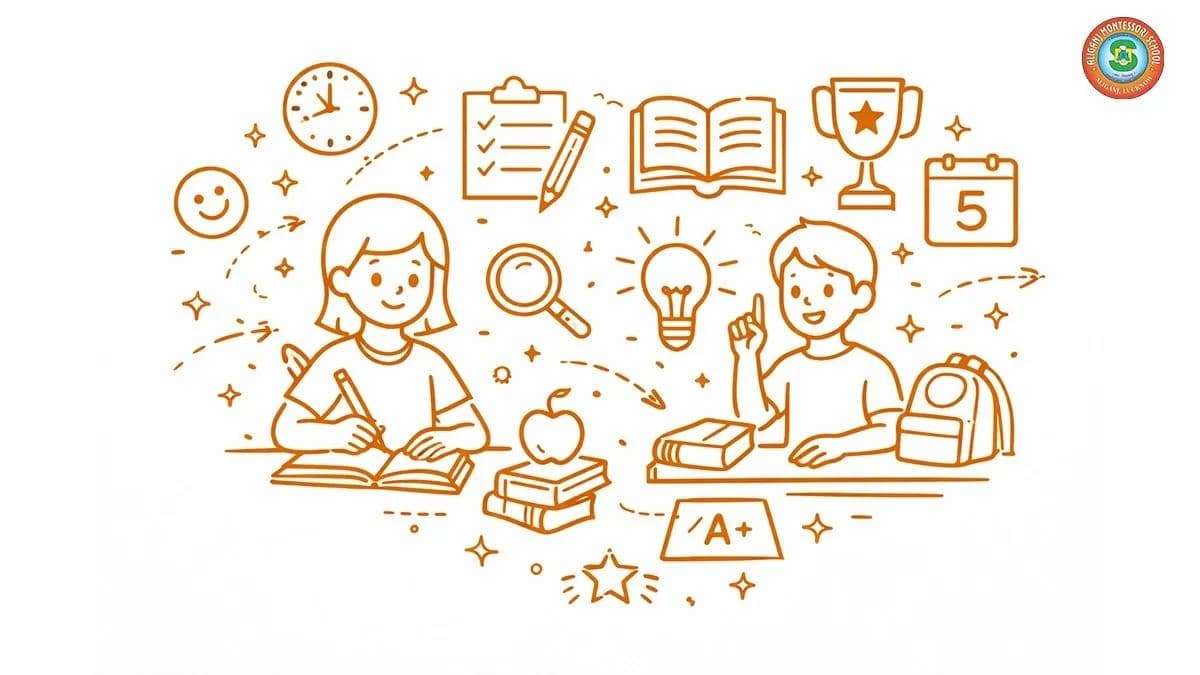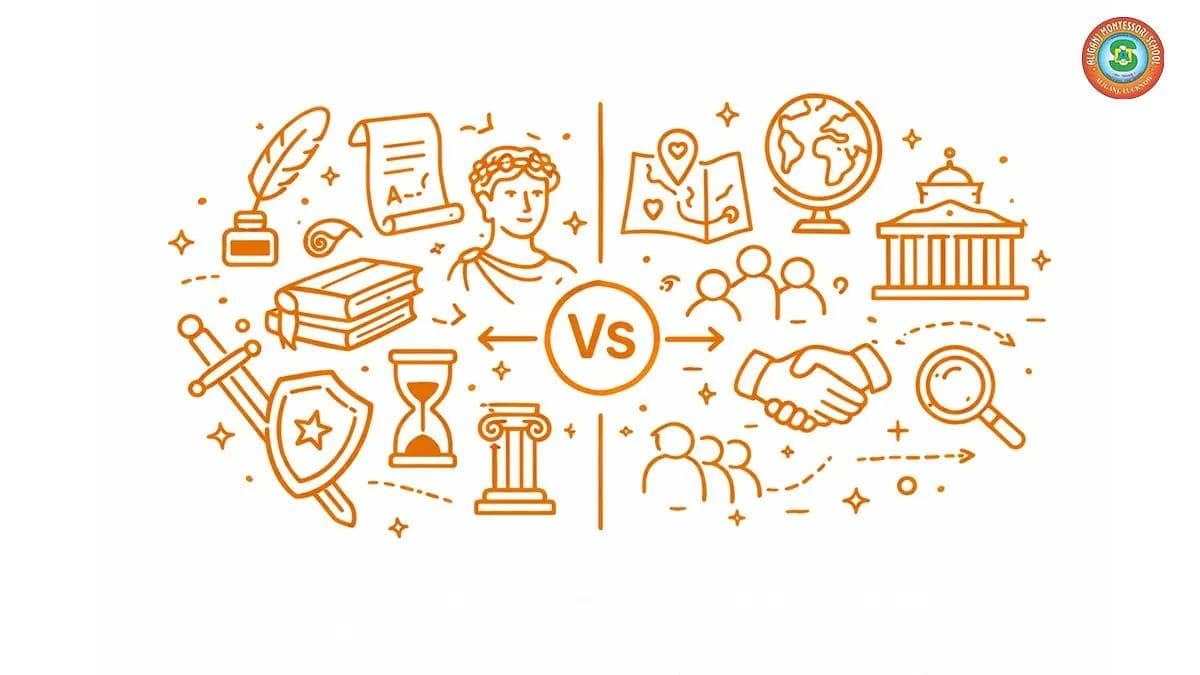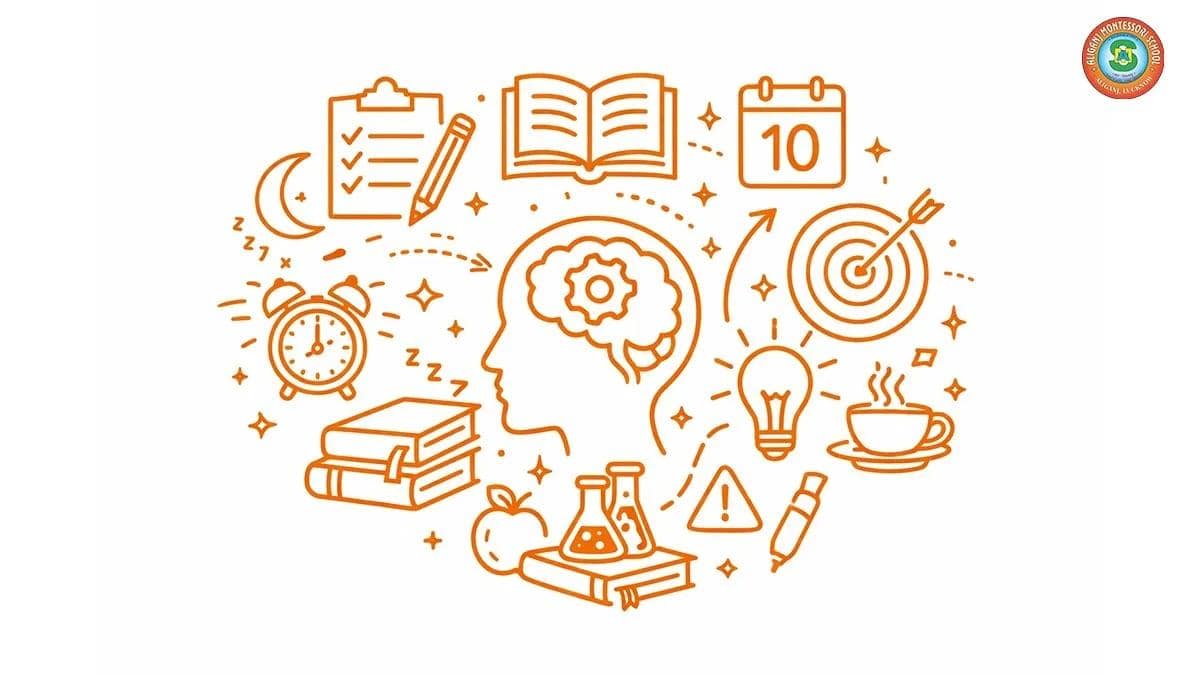Best Study Habits of Students: At Aliganj Montessori School (AMS Lucknow), we strongly believe that establishing strong study habits at an early stage creates a foundation for academic as well as personal success for a lifetime. Whether you are a primary school student learning the fundamentals or a high school student gearing up for board exams, following the best study habits for students can enhance performance and alleviate stress to a great extent.
In this article, AMS Lucknow is discussing the significance of good study habits, effective study methods, time management techniques, and learning methods that assist students in Aliganj and elsewhere succeed in their academic pursuits.
Table of Contents
Why Are Study Habits Important?


Successful study habits are a key to academic success. We at AMS Aliganj believe that how one studies is as crucial as what is studied. Good study skills enhance concentration, time management, and retention, making students feel confident and ready—not frazzled—prior to exams or assignments.
Without a systematic study schedule, students tend to cram at the last moment and suffer from stress and poor performance. Good study habits increase confidence, improve grades, and foster an attitude of lifelong learning.
AMS Aliganj’s Top Study Techniques for Students
Though each student learns in his own way, the following tried-and-tested methods are suitable for most students at AMS:
1. Active Learning
Rather than simply reading notes, work with them! Make flashcards, summarize points, or read out topics. This makes you remember and understand better.
2. Mind Mapping
Represent lessons in diagrams. This aids in connecting ideas, particularly in fields such as science, history, and geography.
3. Practice with Past Papers
Trying question papers of previous years hones exam skills and creates confidence. It’s among the most powerful methods we teach in AMS classrooms in Aliganj.
4. Pomodoro Technique
Study for 25 minutes and take a 5-minute break. This is a way of boosting concentration and avoiding burnout.
5. Group Study
Group learning facilitates peer-to-peer discussion and concept development. Nonetheless, students are advised to stay on task and not get distracted.
Student Time Management Hints for Aliganj
One of the most important values instilled within AMS Lucknow is time management. Here’s how our students can plan their study time more efficiently:
1. Make a Study Timetable
Assign time blocks to each topic. Consistency decreases procrastination.
2. Task Prioritization
Utilize tools such as the Eisenhower Matrix to categorize tasks based on their importance and urgency. Begin with the most difficult ones.
3. Divide Tasks into Mini-Goals
Big assignments become easier to handle if divided into small steps. Students of AMS Aliganj are taught to attack large goals in small steps.
4. Don’t Multitask
Give attention to one subject at a time to ensure better retention and productivity.
Quality is more important than quantity.
5. Establish Realistic Goals
SMART goals (Specific, Measurable, Achievable, Relevant, Time-bound) keep students motivated and moving forward consistently.
Top Learning Strategies for Students – Aliganj Montessori School Method
Learning isn’t about trying harder—it’s about trying smarter. Below are strategies that work wonders for AMS students:
1. Teach What You Learn
Teaching someone else a concept is the best test of one’s understanding. This approach is strongly promoted in peer teaching sessions in AMS.
2. Self-Testing
Employ quizzes or practice questions to test your knowledge. It pinpoints weak areas and strengthens memory.
3. Spaced Repetition
Study subjects at spaced intervals rather than cramming. This helps reinforce long-term memory.
4. Stay Organized
Organize your notes, folders, and assignments. An untidy workspace results in a cluttered mind.
5. Maintain Good Health
Balanced diet, proper sleep, and exercise are essential. At AMS Aliganj, we always encourage “Healthy Mind in a Healthy Body.”
Study Habits as the Key to Achieving Academic Success
We’ve seen at Aliganj Montessori School how regular study habits contribute towards academic success. If students develop planned habits in the initial phases of schooling, they become strong problem solvers with increased resilience and confidence.
Whether it’s setting goals, reviewing regularly, or time blocking, these habits aren’t just beneficial in school—they benefit students for life.
Developing Habits of Consistency
Consistency is the key to long-term achievement. Study habits become automatic with repetition. Here’s how AMS students develop consistent habits:
- Establish fixed daily study times
- Divide tasks into small objectives
- Celebrate small victories
- Review and tune your routine
AMS Lucknow Final Thoughts
Students’ best study habits in Aliganj and all over Lucknow are based on discipline, concentration, and intelligent methods. Our students at AMS are taught to study smart, prioritize, and be responsible for learning.
Begin with small steps, remain constant, and apply the correct strategies. Keep in mind that scholarly triumph isn’t a matter of the number of hours you study—it’s a question of the quality of your studying.
Let’s develop good habits. Let’s develop future leaders.
FAQs – Study Habits & Learning Strategies for Students
1. What are the best student study habits?
The best ones are goal-setting, establishing a study habit, active learning, and employing methods such as spaced repetition and self-testing.
2. How do I improve my time management for studying?
Employ a schedule, prioritize, do not multitask, and adhere to methods such as Pomodoro for systematic breaks.
3. How can I remain focused when studying?
Keep distractions to a minimum, break it up by taking short breaks, and explain it to someone else to help solidify concepts.
4. How do learning strategies aid memory?
Strategies such as active recall, spaced repetition, and frequent practice enhance long-term memory retention.
5. Why do good study habits matter early on?
Early habits determine long-term success. They alleviate stress, enhance performance, and make students self-sufficient and confident learners.







